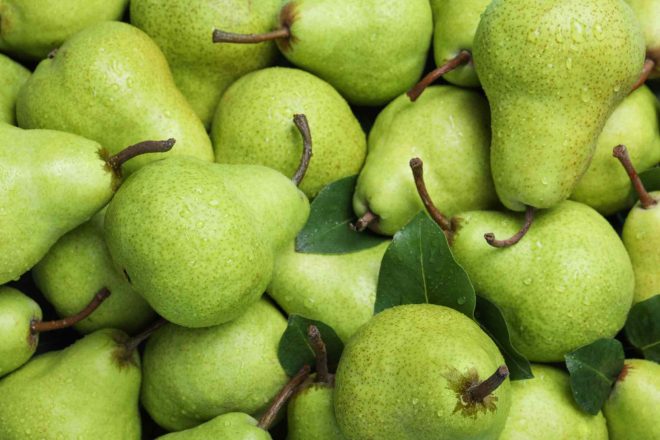
Here are 8 reasons to include the benefits of pears in your diet
Pears are loved by everyone and are good for your health! Find out 8 reasons why you should make them part of a healthy lifestyle.
Delicious and healthy pears are loved and enjoyed by many people around the world. Known for their sweet, delicate taste and velvety beauty, they are loved by people. One of the most versatile fruits ever, pears are much more than just a tasty snack. They are full of vitamins, fiber, and antioxidants that will make you happy. From boosting your immune system to improving digestion to supporting heart health, pears are a fruit you’ll want to include in your diet. If you’re still not convinced, learn more about the benefits of pears and how you can incorporate them into your diet.

Pear Nutritional Value
Pears are a bell-shaped fruit native to China, Europe, and the United States that grow in temperate regions. However, they are found in many parts of the world. They are delicious and are good for your health, mostly because of the nutrients they contain. According to the USDA, a medium-sized raw pear contains:
- Cal: 101
- Protein: 0.36 grams (g)
- Carbohydrates: 15.2 g
- Fiber: 3.1 grams
- Potassium: 116 mg
- Calcium: 9 mg
- Vitamin C: 4.3 mg
- Folic acid or vitamin B9: 7 µg (micrograms)
8 Health Benefits of Pears
Pears are rich in nutrients and have many health benefits:
1. Have anti-inflammatory properties
Inflammation is the body’s immune system that helps you fight bacteria, toxins, and other pathogens. While it’s good for your body, too much of it can lead to problems like asthma, cancer, type 2 diabetes, and Alzheimer’s disease. According to research published in the journal Molecules, pears are rich in flavonoid antioxidants that help reduce inflammation and reduce the risk of disease.
2. Control blood sugar
Pears have a low glycemic index and high fiber content, making them a good choice for diabetics. They also have many properties that help control blood sugar. According to a study published in the American Journal of Nutrition, people who eat five or more pears a week have a 23 percent lower risk of developing type 2 diabetes. Flavonoids in pears may also help reduce the risk of type 2 diabetes.
3. Supports gut health
Fiber is good for intestinal health and is abundant in pears. A study published in the Journal Nutrients found that pears contain soluble and insoluble fiber, which helps regulate bowel movements and increase stool volume, which is beneficial for digestion. If you are constipated, these fruits can help! Pears also contain dietary fiber, including prebiotics, which improve overall digestion.
4. Reduce heart disease
Pears are rich in fiber and antioxidants that are good for your heart. A study published in Frontiers in Nutrition found that an antioxidant called anthocyanins may help protect against heart disease. They also contain fiber, which helps lower cholesterol. High cholesterol is a risk factor for heart disease. The potassium in it also helps control blood pressure, another risk factor for heart disease. Simply put, it’s a great addition to a heart-healthy diet.
5. It May Help You Lose Weight
If you’re wondering which fruit to add to your diet, the answer is pears! According to research published in the Journal Nutrients, obese women who ate three pears in six meals a day lost 1.22 pounds in 12 weeks. It’s low in calories, high in water and high in fiber, so it helps you stay full and lose weight.
6. Control your blood pressure
High blood pressure, or hypertension, can damage your blood vessels and cause problems with your heart, brain, kidneys, and eyes. According to Harvard Health, people who eat more fruits, including pears, may help reduce their risk of high blood pressure. Pears also contain potassium, which helps lower blood pressure, according to Harvard Medical School.
7. Promotes healthy skin
If you’re looking for a way to strengthen your skin barrier and protect your skin, pears can help. Pears are an excellent source of antioxidants and multivitamins that can help you achieve healthy, glowing skin. They do this by preventing damage caused by free radicals and promoting skin healing.
8. Strengthen your defenses
Pears are a fruit rich in nutrients such as vitamins, copper and fiber, all of which help support the immune system. A study published in the Pharmaceutical Journal found that pears have properties that help reduce free radicals and boost immunity. Vitamin C in pears also helps increase the production of white blood cells, supporting the immune system and reducing the risk of disease.

Are there any side effects of pears?
Pears are generally safe to eat, but in some cases they can cause side effects.
Although the fiber in pears is good for digestion, too much fiber can cause digestive problems such as gas, diarrhoea, or bloating.
In rare cases, people who are allergic to pears or other fruits should not eat them without consulting a doctor. Watch for symptoms such as hives, itching, swelling, or difficulty breathing.
Although pears have many health benefits, you should consult your doctor if you experience any symptoms or problems.
